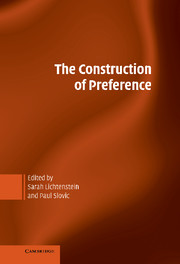Book contents
- Frontmatter
- Contents
- Contributors
- Preface
- Acknowledgments
- I INTRODUCTION
- II PREFERENCE REVERSALS
- III PSYCHOLOGICAL THEORIES OF PREFERENCE REVERSALS
- IV EVIDENCE FOR PREFERENCE CONSTRUCTION
- V THEORIES OF PREFERENCE CONSTRUCTION
- 17 Constructive Consumer Choice Processes
- 18 Decision Making and Action: The Search for a Dominance Structure
- 19 Pre- and Post-Decision Construction of Preferences: Differentiation and Consolidation
- 20 Choice Bracketing
- 21 Constructing Preferences From Memory
- VI AFFECT AND REASON
- VII MISWANTING
- VIII CONTINGENT VALUATION
- IX PREFERENCE MANAGEMENT
- References
- Index
21 - Constructing Preferences From Memory
Published online by Cambridge University Press: 05 June 2012
- Frontmatter
- Contents
- Contributors
- Preface
- Acknowledgments
- I INTRODUCTION
- II PREFERENCE REVERSALS
- III PSYCHOLOGICAL THEORIES OF PREFERENCE REVERSALS
- IV EVIDENCE FOR PREFERENCE CONSTRUCTION
- V THEORIES OF PREFERENCE CONSTRUCTION
- 17 Constructive Consumer Choice Processes
- 18 Decision Making and Action: The Search for a Dominance Structure
- 19 Pre- and Post-Decision Construction of Preferences: Differentiation and Consolidation
- 20 Choice Bracketing
- 21 Constructing Preferences From Memory
- VI AFFECT AND REASON
- VII MISWANTING
- VIII CONTINGENT VALUATION
- IX PREFERENCE MANAGEMENT
- References
- Index
Summary
Our memories define who we are and what we do. Aside from a few preferences hardwired by evolution, they also define what we like and how we choose. The increasingly more hierarchical coding of experience in memory makes a gourmet out of a gourmand. Grieving as a process of letting go of departed loved ones involves the extinction of associations between them and a host of daily encountered stimuli that serve as constant reminders of their absence. Memory processes in the construction of value and preference even have a utility of their own. We savor the memory and anticipation of pleasant choice options and may delay choice to lengthen the pleasurable experience (Loewenstein, 1988). Yet, despite this wealth of evidence of the involvement of memory processes in preference and choice, their role in preference construction has largely been ignored in existing models of judgment and decision making (Johnson & Weber, 2000; Weber, Goldstein, & Barlas, 1995).
In this chapter, we argue that our view of preference changes if conceptualized explicitly as the product of memory representations and memory processes. We draw on insights about the functions and operations of memory provided by cognitive psychology and social cognition to show that memory plays a crucial role in preference and choice. Economics and behavioral decision research have traditionally been silent on the nature and role of memory processes in preference formation, preferring to treat preference and choice in an “as-if” fashion as mathematical transformations and integrations of the features of choice objects, taking inspiration from psychophysics rather than cognitive psychology.
Information
- Type
- Chapter
- Information
- The Construction of Preference , pp. 397 - 410Publisher: Cambridge University PressPrint publication year: 2006
Accessibility standard: Unknown
Why this information is here
This section outlines the accessibility features of this content - including support for screen readers, full keyboard navigation and high-contrast display options. This may not be relevant for you.Accessibility Information
- 64
- Cited by
